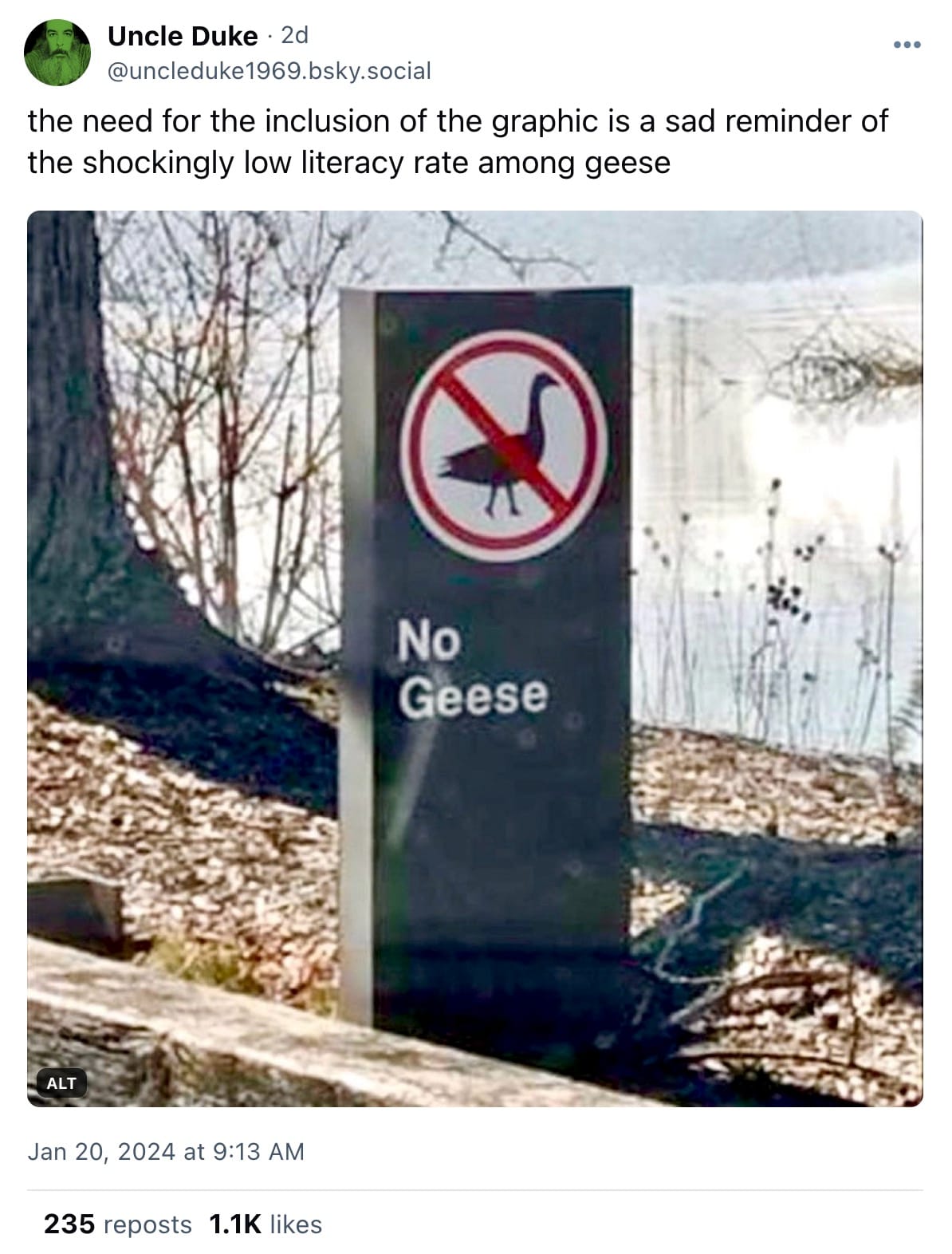Updates from Adam Isacson (January 22, 2024)
Hi, this is Adam. If you're receiving this message, it means you signed up on my website to receive regular updates. If you'd like to stop getting these, just follow the instructions further down.
This week's edition has a fair amount of content, including a weekly Border Update, a panel discussion, and a look at Colombia's peace process over the past month. And of course, upcoming events and some recommended readings.
Weekly U.S.-Mexico Border Update: January 19, 2024
With this series of weekly updates, WOLA seeks to cover the most important developments at the U.S.-Mexico border.
- Read this week's edition here.
- See past weekly updates here.
- For 2024 - read our daily border links posts here. You can subscribe to the daily border links list here.
THIS WEEK IN BRIEF:
In the most recent escalation of its hardline border policies, the state government of Texas barred Border Patrol agents from a riverfront park in the border city of Eagle Pass. Two days later, a woman and two children drowned in the Rio Grande. Texas National Guardsmen prohibited Border Patrol from entering the park even in emergencies. The Biden administration sent Texas a cease-and-desist letter, and the state-federal jurisdictional clash will likely go to federal court.
Following a meeting between President Biden and congressional leadership, top senators said a deal could emerge next week that might allow the President’s request for Ukraine aid and other priorities to move forward. The price would be meeting some Republican demands for restrictions on asylum and perhaps other migration pathways, which a small group of senators continues to negotiate. Even if senators reach a deal, it could fail in the Republican-majority House, where demands for migration curbs are more extreme.
After setting records in December, migration encounters at the U.S.-Mexico border have dropped by more than half since the holidays. Biden administration officials claim that Mexico’s government has contributed to the drop with more aggressive migration control efforts. Numbers are also down significantly in the treacherous Darién Gap region between Colombia and Panama.
What My Wife Did To Our Car After It Snowed in Washington

Colombia’s Peace Process: Some Links from the Past Month
Negotiators from the government and the “Central General Staff” (EMC)—the group of FARC dissidents that rejected the peace accord before its 2016 signing—completed a third, ten-day round of negotiations on January 18. Commitments included a dissident pledge to cease recruiting minors, a government pledge to evaluate the situation of jailed EMC members, and steps toward a negotiating agenda that will include environmental issues. They also ratified earlier agreements to halt EMC kidnappings and to extend a bilateral ceasefire through July 15.
With support from the UN and OAS peace missions, four out of five regional offices for verification of the EMC ceasefire have now been established: in Arauca, Santander, Meta, and Putumayo.
At the UN Security Council’s quarterly review of peace accord implementation in Colombia, on January 11, the U.S. representative withheld—for now—U.S. government support for including EMC ceasefire verification within the UN peace mission’s mandate. “These agreements still lack maturity,” said U.S. Acting Deputy Permanent Representative Elisabeth Millard.
Citing “intelligence reports,” El Tiempo estimated that the EMC “has, counting all its structures, 3,480 people in arms.”
- Camilo A. Castillo, “Con Acuerdos Sobre la Agenda y el Reclutamiento, se Cerro Tercer Ciclo Con Disidencias” (El Tiempo (Colombia), January 18, 2024).
- Camilo A. Castillo, “Listas Cuatro de las Cinco Oficinas Regionales para Verificar Tregua Con Disidencias” (El Tiempo (Colombia), January 17, 2024).
- Manuel Rueda, “Colombia Extends Cease-Fire With Farc Splinter Group in Bid to Reduce Rural Violence” (Associated Press, Associated Press, January 15, 2024).
- “Participacion y Temas Ambientales: Asi Avanza el Tercer Ciclo de Dialogo Con Disidencia” (El Espectador (Colombia), January 15, 2024).
- Ambassador Elisabeth Millard, Remarks at a un Security Council Briefing on Colombia (United States Mission to the United Nations, Thursday, January 11, 2024
- “Ee. Uu. Condiciona Ampliacion de Mandato de Mision de Onu para Verificar Cese Con Disidencia” (El Espectador (Colombia), January 11, 2024).
Representatives of the Security Council will visit Colombia in February, the UN body announced during its January 11 quarterly review of Colombia’s peace efforts.
- “Unsc Rep Pushes for Colombia Peace Agreement Execution” (United Nations, January 11, 2024).
- Camilo A. Castillo, “Miembros del Consejo de Seguridad de la Onu Visitaran Colombia en Febrero” (El Tiempo (Colombia), January 11, 2024).
- Camilo A. Castillo, “‘Es Necesario Avanzar en la Implementacion y en Iniciativas de Dialogo’: Ruiz Massieu” (El Tiempo (Colombia), January 11, 2024).
Government and ELN negotiators are to hold a sixth round of talks in Cuba from January 22 to February 6. High Commissioner for Peace Otty Patiño repeated the government’s insistence that the current ceasefire, which must be renewed by January 29, include an end to ELN kidnappings and the release of all remaining guerrilla captives.
The government reportedly gave the ELN a list of 26 kidnapped people whose release it demands. Army Sgt. Libey Danilo Bravo, whose the ELN kidnapped in Arauca for three weeks last February and March, told La Silla Vacía that the guerrillas took him to a makeshift prison across the border in Venezuela that they called “Alcatraz,” where they were holding ten other people.
ELN leader Antonio García said that the group would require government financing to sustain itself if it were to suspend ransom kidnappings while peace talks continue. Patiño said that the government would only seriously consider financing if the ELN committed to the conflict’s end “in a decisive and clear way.”
Between December 4 and January 3, the think-tank CERAC counted three ELN offensive actions considered to be ceasefire violations: a homicide, a kidnapping, and an armed attack on a vehicle.
- “Las Pullas del Gobierno Petro al Eln a Pocos Dias del Nuevo Ciclo de Dialogos en Cuba” (El Espectador (Colombia), January 18, 2024).
- ““Financiacion del Eln Dependera del Fin del Conflicto y de la Voluntad para Dejar las Armas”: Otty Patino” (Revista Cambio (Colombia), January 18, 2024).
- Camilo A. Castillo, “Otty Patino al Eln: ‘Plantearemos Financiacion Cuando se Avizore el Fin del Conflicto’” (El Tiempo (Colombia), January 17, 2024).
- “La Prorroga del Cese al Fuego Con el Eln Esta en Cuidados Intensivos” (Revista Cambio (Colombia), January 17, 2024).
- David Fernando Correal, “Informe de Incumplimientos y Violaciones del Cese el Fuego Bilateral Nacional y Temporal Con el Eln” (CERAC (Colombia), January 17, 2024).
- Armando Neira, “‘Acuerdos Con el Eln Son Claros y Estan por Escrito’: Gobierno Tras Palabras de Garcia” (El Tiempo (Colombia), December 27, 2023).
- Manuel Rueda, “Colombia’s Eln Rebels Say They Will Only Stop Kidnappings for Ransom if Government Funds Cease-Fire” (Associated Press, Associated Press, December 26, 2023).
- Armando Neira, “¿Es ‘Antonio Garcia’ el Palo en la Rueda para Negociacion Con el Eln? Analisis” (El Tiempo (Colombia), December 26, 2023).
- Santiago Rodriguez Alvarez, “En 2023 Colombia Recordo el Secuestro y Trazo una Linea Roja a la Paz” (La Silla Vacia (Colombia), December 22, 2023).
- Camilo A. Castillo, “Pablo Beltran Dice Que la Instruccion para el Eln Es Liberar a Todos los Secuestrados” (El Tiempo (Colombia), December 20, 2023).
President Gustavo Petro met with Pope Francis on January 19; he requested that a future round of ELN peace talks take place at the Vatican.
- “Gustavo Petro Buscara Que una Ronda de Negociacion Con el Eln Sea en el Vaticano” (El Espectador (Colombia), January 19, 2024).
- Aura Maria Saavedra Alvarez, “Las Propuestas y Claves del Encuentro Entre el Presidente Petro y el Papa Francisco” (El Tiempo (Colombia), January 19, 2024).
Otty Patiño expanded his staff at the High Commissioner for Peace office from 13 to 149 people, a number closer to the staffing strength that existed during the government of Iván Duque (2018-2022).
- “Los 136 Cargos Que Creo Presidencia por Decreto para el Alto Comisionado para la Paz” (El Espectador (Colombia), January 1, 2024).
- “Fuertes Criticas de la Oposicion a la Nueva Nomina de la Oficina del Comisionado de Paz” (El Tiempo (Colombia), January 2, 2024).
On January 14 in Pitalito, Huila, José Enrique Roa Cruz became the third FARC ex-combatant to be killed in 2024 and at least the 411th since the former guerrilla group’s 2017 demobilization. The UN Verification mission counted 47 killings in 2023, the fewest since 2017.
- “Confirman Asesinato de Jose Roa, Ex-Farc Que Fue Secuestrado Con Sus Escoltas” (El Espectador (Colombia), January 16, 2024).
- “Report of the Secretary General S/2023/1033, 27 September to 26 December 2023” (UN Verification Mission in Colombia, January 11, 2024).
- “Sigue el Riesgo para Firmantes de Paz: El 2024 Inicio Con Asesinato de un Ex-Farc” (El Espectador (Colombia), January 2, 2024).
The Petro government transferred 363 billion pesos (US$93 million) to the Presidency’s Implementation Unit, where it will go toward ex-combatant reintegration programs and the Territorially Focused Development Programs (PDET) foreseen in chapter 1 of the 2016 peace accord.
- “Gobierno Le Inyecto Otros $363 Mil Millones a la Implementacion del Acuerdo Con las Farc” (El Espectador (Colombia), January 18, 2024).
In addition to moving the ELN and EMC peace processes forward, in 2024 the Petro administration has big decisions to make about the future of talks with regional gangs, with the Segunda Marquetalia FARC dissident group, and with the Gulf Clan paramilitary structure, wrote Camilo Pardo and Cindy Morales at El Espectador. The Catholic Church’s representative to the peace process, Msgr. Héctor Fabio Henao, told El Espectador that no roadmap currently exists for eventual talks with the Segunda Marquetalia and the Gulf Clan.
- Camilo Pardo Quintero, Cindy A. Morales Castillo, “Lo Que se Viene en los Dialogos y Negociaciones de la Paz Total de Petro en 2024” (El Espectador (Colombia), January 2, 2024).
- Daniel Valero, ““El Orden Publico Es una Preocupacion”: Iglesia Catolica” (El Espectador (Colombia), January 15, 2024).
“Colombia’s quest for ‘total peace’…has become a thorny path, with some progress, but slower than President Gustavo Petro had anticipated,” according to an Associated Press analysis.
- Astrid Suarez, ““Paz Total” de Petro en Colombia Avanza Mas Despacio de Lo Esperado Luego de Atravesar Crisis” (Associated Press, Associated Press, December 25, 2023).
Video: Migration Dynamics: Trends, Challenges, and Opportunities in the Northern Triangle
Many thanks to New York-based Network 20/20, an organization “that bridges the gap between the private sector and foreign policy worlds,” for inviting me to participate in a virtual panel last Thursday. With Elizabeth Oglesby of the University of Arizona and Diego de Sola of Glasswing International, we talked about the causes of migration away from Central America, and the good and bad of U.S. policies, past and present.
Arms Transfers in the Americas: Some Links from the Past Month
Ecuador President Daniel Noboa said that his government will turn over used Russian and Ukrainian military equipment to the United States, and receive about $200 million in U.S. equipment in return.
- Carlos Vanegas, “Ecuador Entregara Material Militar Ruso a Estados Unidos Valorado en 200 Millones de Dolares a Cambio de Equipamiento Moderno” (Defensa.com, January 12, 2024).
Video from recent military exercises showed that Venezuela possesses Iranian-made Zolfaghar naval patrol boats. “Aside from the Zolfaghar boats, Iran has also provided Venezuela with drones, rockets and missiles,” France24 noted in a report listing some of the models.
- Alijani Ershad, “Venezuela’s Zolfaghar Boats Are Just the Latest Military Equipment Provided by Iran” (The Observers, France24 (France), January 10, 2024).
“We did not manage to finalize a deal, neither with the French nor with the Swedes” by the end of the year to purchase fighter jets to replace an aging fleet of 12 Israeli-made Kfir planes, said Colombia‘s defense minister, Iván Velásquez. In a long-planned purchase that will total well into the billions of dollars, Colombia is choosing between Sweden’s Saab Gripen, France’s Dassault Rafale, and the United States’ Lockheed Martin F-16.
- Javier Patino C., “Esto Cuestan los Aviones Ofrecidos a Colombia para Reemplazar a los Kfir” (Revista Cambio (Colombia), December 23, 2023).
Peru‘s armed forces placed a $664,000 order for 540 South Korean-made anti-riot grenade launchers. “The acquisition seeks to provide the Armed Forces with anti-riot material for the National Police Support Operations in case of possible demonstrations in Lima and nationwide,” reported Defensa.com.
- Alejo Marchessini, “Lanzagranadas Antimotines para el Comando Conjunto de las Fuerzas Armadas del Peru” (Defensa.com, December 19, 2023).
The right-leaning Bolivian daily El Deber reported that Bolivia‘s left-of-center government has purchased over $31 million in crowd control or anti-riot equipment for its police in the past year. The Interior Ministry stated, “The equipment delivered should not be understood as a synonym of confrontation, much less as a preparation for a ‘war’, this type of assertions are not consistent with reality.”
- “Este Lunes se Publico una Nota Periodistica Titulada Gobierno Invirtio Sus 31.5 Millones en Material Antimotin para un Ano Que se Vislumbra Conflictivo” (El Deber (Bolivia), January 2, 2024).
On Cannabis Policy, “The Federal Government Is Recognizing the Reality That Several States Have Already Recognized”

I’m in last Tuesday’s edition of Y Esto No Es Todo, the Spanish-language podcast of Georgetown University’s Americas Institute, talking with host Juan Carlos Iragorri about the U.S. federal government’s movement toward reclassifying marijuana as a lower-risk drug. Here are my comments in English:
Well, it’s pretty important that the U.S. federal government is following in the footsteps of the states and softening its standards on marijuana a bit. And it’s happening for a number of reasons.
First, because the boomer generation, those who were born after World War II, almost all of them lived or experimented with marijuana as young people and they know it didn’t do them much harm. And that has really changed attitudes quite a bit in the last 20, 30 years about marijuana laws.
Also the fact that marijuana is less addictive than other drugs that are lower, in fact, in the scheme that the DEA uses to classify drugs, like cocaine. Cocaine is much more addictive. Alcohol is legal and it’s more addictive. Then marijuana is seen as maybe something that carries less social harm, health harm, than some of the others. And now the fact that more and more medicinal uses are being discovered is quite important.
The third is simply that enforcing anti-marijuana laws is draining the resources of police across the country. Instead of having to catch those who are using or selling marijuana, they can focus on drugs and much more serious criminal phenomena. And that’s freeing up a lot more resources. And you see that in states where marijuana has been legalized or regulated, there are no increases in violent crime in recent years.
So all of that is changing attitudes. And finally the federal government is recognizing the reality that several states have already recognized.
Get Daily Border Links in your Email

I’ve established a pretty good morning workflow to produce these “daily border links” updates, a key part our 2024 rapid-response approach to migration and border security issues. So in order to make them even more accessible, I’ve created a Google Group mailing list, so you can get them in your inbox as soon as I publish them.
Just click the link and add your e-mail address if you’re interested. (And if that's all the content you want, feel free to unsubscribe here!)
Latin America-Related Events in Washington and Online This Week
(Events that I know of, anyway. All times are U.S. Eastern.)
Monday, January 22, 2024
- 4:00-5:00 at atlanticcouncil.org: LAC2024: The stories we’ll likely be talking about (RSVP required).
Tuesday, January 23, 2024
- 8:00-9:30 at Zoom: The human rights crisis in Mexico: the road towards Mexico’s fourth cycle to the Universal Periodic Review (RSVP required).
- 12:00-2:00 at Centro PRODH Facebook Live: México Ante la 4ª revisión del Examen Periódico Universal de la ONU (RSVP required).
- 4:00-5:30 at American University: Book Launch and Commemoration:The North American Research Initiative (RSVP required).
Wednesday, January 24, 2024
- 9:30-11:00 at USIP: The Afro-Indigenous Peoples of Honduras: Exclusion, Conflict, and Migration (RSVP required).
Links from the Past Week
Uriel J. Garcia, In Eagle Pass, a Tense Border Standoff Between Texas and the Federal Government Is Reaching a Crescendo (The Texas Tribune, Monday, January 22, 2024).
A park on the Rio Grande is the new focus of a long battle over border enforcement that’s reached the U.S. Supreme Court—a thorough overview of the situation
What We Know About the Biden Administration's Safe Mobility Initiative (International Refugee Assistance Project, Friday, January 19, 2024).
An overview of the still-small offices that the Biden administration has set up in Colombia, Costa Rica, Ecuador, and Guatemala to help some migrants access legal migration pathways instead of traveling overland to the U.S.-Mexico border
Roman Gressier, The Indigenous Resistance Puts Its Doubts and Hopes in Arevalo's Hands (El Faro (El Salvador), Tuesday, January 16, 2024).
As Bernardo Arévalo is sworn in as Guatemala's reformist president despite bitter resistance from corrupt elements, here's a look at a sector whose actions were crucial to getting him there
Estados Unidos ‘No Hara' Operaciones Contra Actividades Maritimas Ilicitas Sin Autorizacion de Ecuador, Plantea Tratado Internacional (El Universo (Ecuador), Tuesday, January 16, 2024).
A look at the contents of security assistance agreements that the U.S. government reached with Ecuador last year, and which are now very relevant as an official U.S. delegation visits to discuss new aid to fight organized crime
And Finally



